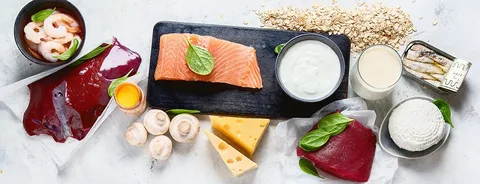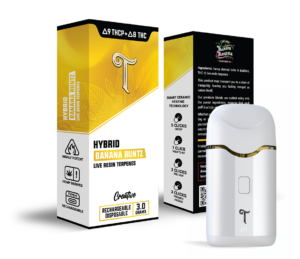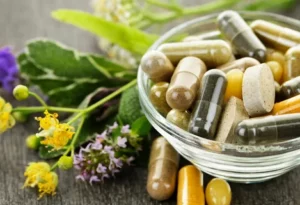Vitamin B12, also known as cobalamin, is a crucial nutrient that plays a key role in maintaining healthy nerve cells, supporting red blood cell formation, and promoting DNA synthesis. While it is present in a variety of foods, animal products are particularly rich sources of this essential vitamin. This guide explores how you can effectively increase your Vitamin B12 intake through various animal products, ensuring you meet your nutritional needs and support your overall health.
Understanding Vitamin B12
What is Vitamin B12?
Vitamin B12 is a water-soluble vitamin that is naturally present in animal foods and added to fortified foods. It is essential for the production of red blood cells and DNA synthesis. It also helps maintain the health of nerve cells and supports brain function.
Why is Vitamin B12 Important?
Vitamin B12 is vital for several bodily functions:
- Nerve Health: It helps in the formation of the myelin sheath that surrounds and protects nerve cells.
- Red Blood Cell Formation: Adequate levels of B12 are necessary for producing healthy red blood cells, which transport oxygen throughout the body.
- DNA Synthesis: Vitamin B12 is crucial for proper DNA synthesis, affecting cell division and growth.
Animal Products Rich in Vitamin B12
Meat and Poultry
Beef Liver: Beef liver is one of the richest sources of Vitamin B12. A single serving can provide more than 1,000% of the Daily Value (DV).
Chicken: Chicken, particularly dark meat, contains substantial amounts of Vitamin B12. It’s a versatile option that can be included in various dishes.
Pork: Pork products, such as pork chops and pork loin, are also good sources of Vitamin B12. A serving of pork can contribute significantly to your daily B12 needs.
Fish and Seafood
Clams: Clams are incredibly high in Vitamin B12. Just a small serving can cover several times your daily requirement.
Salmon: Salmon is not only rich in Vitamin B12 but also offers heart-healthy omega-3 fatty acids. It’s a delicious and nutritious option for boosting B12 intake.
Sardines: Sardines are another excellent source of Vitamin B12 and can be eaten fresh or canned. They also provide a good amount of calcium.
Dairy Products
Milk: Milk and dairy products are good sources of Vitamin B12. One cup of milk provides about 18% of the DV.
Cheese: Certain cheeses, like Swiss and cheddar, contain significant amounts of Vitamin B12. Incorporating cheese into your diet can help increase your intake.
Yogurt: Yogurt is another dairy product that provides Vitamin B12. It’s also a good source of probiotics for digestive health.
Eggs
Egg Yolks: Egg yolks are a valuable source of Vitamin B12. They are versatile and can be used in a variety of dishes, from scrambled eggs to baked goods.
Whole Eggs: Whole eggs contain Vitamin B12 along with other essential nutrients. Including eggs in your diet is an easy way to boost your B12 levels.
Tips for Maximizing Vitamin B12 Absorption
Cook Animal Products Properly
Cooking methods can affect Vitamin B12 content. To maximize B12 absorption:
- Avoid Overcooking: Excessive heat can destroy Vitamin B12, so cook meats and fish to the appropriate temperature without overdoing it.
- Use Gentle Cooking Methods: Baking, steaming, and grilling are preferable to frying or boiling.
Combine with Other Nutrients
Certain nutrients can enhance the absorption of Vitamin B12:
- Vitamin C: Consuming Vitamin C-rich foods (like fruits and vegetables) alongside Vitamin B12 sources may aid absorption.
- Folate: Adequate folate levels are important for Vitamin B12 metabolism. Foods rich in folate include leafy greens and legumes.
Special Considerations
Vegetarians and Vegans
Individuals who follow vegetarian or vegan diets might have difficulty meeting their Vitamin B12 needs through animal products. In such cases, fortified foods and supplements are recommended.
Age and Health Conditions
As we age, our ability to absorb Vitamin B12 from food may decrease. People with certain health conditions, such as digestive disorders, may also face absorption challenges. Consulting with a healthcare provider can help manage these issues effectively.
Frequently Asked Questions
What are the best animal sources of Vitamin B12?
Clams, beef liver, salmon, and sardines are among the best sources of Vitamin B12. These foods provide high levels of the vitamin in relatively small servings.
How much Vitamin B12 do I need daily?
The recommended dietary allowance (RDA) for Vitamin B12 varies by age and life stage. For most adults, the RDA is 2.4 micrograms per day. Pregnant and breastfeeding women have higher needs.
Can I get enough Vitamin B12 from animal products alone?
Yes, if you consume a variety of animal products, you can meet your Vitamin B12 needs. However, it’s important to include a range of sources to ensure balanced nutrition.
Are there any risks associated with consuming too much Vitamin B12?
Vitamin B12 is water-soluble, so excess amounts are typically excreted through urine. High doses are generally considered safe, but it’s always best to consult with a healthcare provider if you have concerns.
How can I tell if I’m deficient in Vitamin B12?
Symptoms of Vitamin B12 deficiency include fatigue, weakness, numbness or tingling in the hands and feet, and memory problems. Blood tests can confirm deficiency.
Can Vitamin B12 supplements be a substitute for animal products?
Vitamin B12 supplements can be an effective alternative, especially for those with dietary restrictions. However, incorporating animal products into your diet is a natural way to obtain the vitamin along with other essential nutrients.
How does Vitamin B12 affect energy levels?
Vitamin B12 is crucial for energy production. A deficiency can lead to fatigue and weakness, while adequate levels help maintain optimal energy levels.
What are the benefits of consuming Vitamin B12 from animal products versus supplements?
Animal products provide not only Vitamin B12 but also other nutrients like protein, iron, and omega-3 fatty acids. Supplements can be effective but lack the additional nutritional benefits of whole foods.
Can cooking affect the Vitamin B12 content in foods?
Yes, cooking can impact Vitamin B12 levels. To preserve the vitamin, use gentle cooking methods and avoid overcooking.
Are there any dietary combinations that enhance Vitamin B12 absorption?
Combining Vitamin B12-rich foods with those high in Vitamin C or folate can enhance absorption. For example, eating a B12-rich fish meal with a side of citrus fruit can be beneficial.
Conclusion
Boosting your Vitamin B12 intake through animal products is a straightforward way to support your health and ensure you meet your nutritional needs. By incorporating a variety of B12-rich foods like meat, poultry, fish, dairy, and eggs into your diet, you can maintain optimal levels of this essential nutrient. If you have specific dietary needs or health concerns, consult with a healthcare provider to tailor your approach and ensure you are meeting your Vitamin B12 requirements effectively.
- What To Do After Having Lip Filler - May 23, 2025
- What Are The Best Times To Take CBD Gummy Edibles - May 22, 2025
- How To Achieve A Youthful Look By Correcting A Downturned Smile - May 21, 2025



